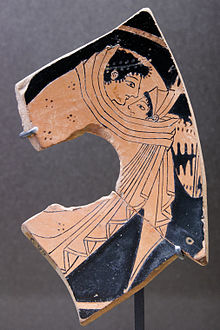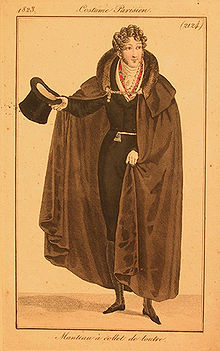- Cloak
-
For other uses, see Cloak (disambiguation).
 Cloak, 1580-1600 Victoria and Albert Museum no. 793-1901
Cloak, 1580-1600 Victoria and Albert Museum no. 793-1901
A cloak is a type of loose garment that is worn over indoor clothing and serves the same purpose as an overcoat; it protects the wearer from the cold, rain or wind for example, or it may form part of a fashionable outfit or uniform. Cloaks are as old as human history; there has nearly always been some form of long, unstructured outer garment used to protect people from the weather. Over time cloak designs have been changed to match current styles and textile needs.
Cloaks generally fasten at the neck or over the shoulder, vary in length, from hip all the way down to the ankle, mid-calf being the normal length. They may have an attached hood, and may cover and fasten down the front, in which case they have holes or slits for the hands to pass through. However, cloaks are almost always sleeveless.
Contents
Opera cloak
In full evening dress in the Western countries, ladies and gentlemen frequently use the cloak as a fashion statement, or to protect the fine fabrics of eveningwear from the elements, especially where a coat would crush; or hide; the garment. Opera cloaks are made of quality materials such as wool or cashmere, velvet and satin.
Ladies may wear a long (over the shoulders or to ankles) cloak usually called a cape, or a full-length cloak. Gentlemen wear an ankle- or full-length cloak. Formal cloaks often have expensive, coloured linings and trimmings such as silk, satin, velvet and fur.
In literature and the arts
 Couple hiding under the same cloak, fragment of an Ancient Greek red-figure cup, ca. 525 BC–500 BC, found in Athens. Louvre Museum, Paris.
Couple hiding under the same cloak, fragment of an Ancient Greek red-figure cup, ca. 525 BC–500 BC, found in Athens. Louvre Museum, Paris.
Cloaks are a staple garment in the fantasy genre due to the popularity of medieval settings, although fantasy cloak designs normally have more resemblance to 18th- or 19th-century cloaks rather than medieval ones. They are also usually associated with witches, wizards and vampires; the best-known stage version of Dracula, which first made actor Bela Lugosi prominent, featured him wearing it so that his exit through a trap door concealed on the stage could seem sudden. When Lugosi reprised his role as Dracula for the 1931 Universal Studios motion picture version of the play, he retained the cloak as part of his outfit, which made such a strong impression that cloaks came to be equated with "Count" Vladislav Dracula in nearly all non-historical media depictions of him.
Fantasy
Fantasy cloaks are often magical. For example, they may grant the person wearing it invisibility as in the Harry Potter series by J. K. Rowling. A similar sort of garment is worn by the members of the Fellowship of the Ring in The Lord of the Rings by J. R. R. Tolkien, although instead of granting complete invisibility, the Elf-made cloaks simply appear to shift between any natural color (e.g. green, gray, brown) to help the wearer to blend in with their surroundings. Alternatively, they may reflect magical projectiles, as the "cloak of magic resistance" in NetHack. In addition, the magical hide armor that Hercules made for himself from the skin of the Nemean Lion, at the end of Hercules' first labor, might also be seen as an early idea of a magical cloak. This latter was notable because it was said to be impervious to all cutting and impact weapons.
Metaphor
Figuratively, a cloak may be anything that disguises or conceals something. In many science fiction worlds such as Star Trek and Stargate, there are cloaking devices, which provide a way to avoid detection or to make an object appear invisible.
Because they keep a person hidden and conceal a weapon, the phrase cloak and dagger has come to refer to espionage and secretive crimes: it suggests murder from hidden sources. "Cloak and dagger" stories are thus mystery, detective, and crime stories of this atmosphere.
See also
References
- Oxford English Dictionary
- Ashelford, Jane: The Art of Dress: Clothing and Society 1500-1914, Abrams, 1996. ISBN 0-8109-6317-5
- Baumgarten, Linda: What Clothes Reveal: The Language of Clothing in Colonial and Federal America, Yale University Press, 2002. ISBN 0-300-09580-5
- Payne, Blanche: History of Costume from the Ancient Egyptians to the Twentieth Century, Harper & Row, 1965. No ISBN for this edition; ASIN B0006BMNFS
- Picken, Mary Brooks: The Fashion Dictionary, Funk and Wagnalls, 1957. (1973 edition ISBN 0-308-10052-2)
Categories:- Formalwear
- History of clothing
- Costume design
- Robes and cloaks
Wikimedia Foundation. 2010.

